ACC301 - Assessing Audit Quality: Independence and Expectation Gap
VerifiedAdded on 2023/06/04
|10
|2477
|86
Essay
AI Summary
This essay provides an overview of audit quality, its assessment, and the impact of auditor independence and the audit expectation gap, particularly within the Australian context. It discusses the key drivers of audit quality as identified in Treasury's paper, including the Australian audit regulation framework, professional accounting boards, audit firm processes, audit reporting usefulness, and other external factors. The essay also examines initiatives for assessing audit quality, such as ASIC audit inspection programs, stakeholder initiatives, and review processes by professional bodies. It emphasizes the importance of auditor independence, outlining the legal and ethical standards that govern it, and analyzes the threats to independence, such as auditor-client relationships and non-audit services. Furthermore, the essay addresses the audit expectation gap, focusing on the responsibilities of auditors in detecting fraud and the impact of this gap on audit quality. It concludes by highlighting the need for clear communication and understanding between auditors and stakeholders to bridge the expectation gap and enhance the reliability of audit reports. This document is contributed by a student and available on Desklib, a platform with AI-based study tools for students.
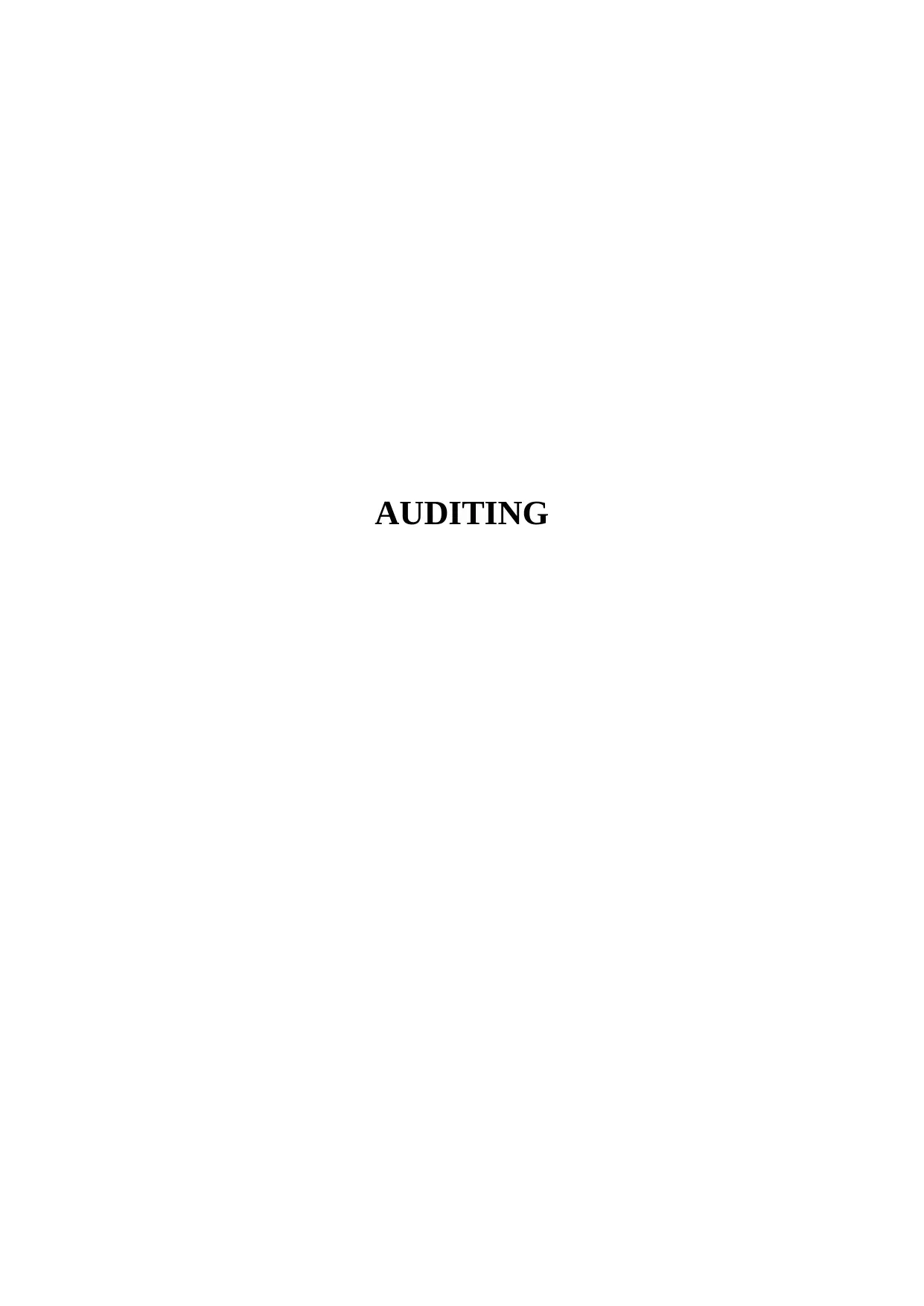
AUDITING
Paraphrase This Document
Need a fresh take? Get an instant paraphrase of this document with our AI Paraphraser
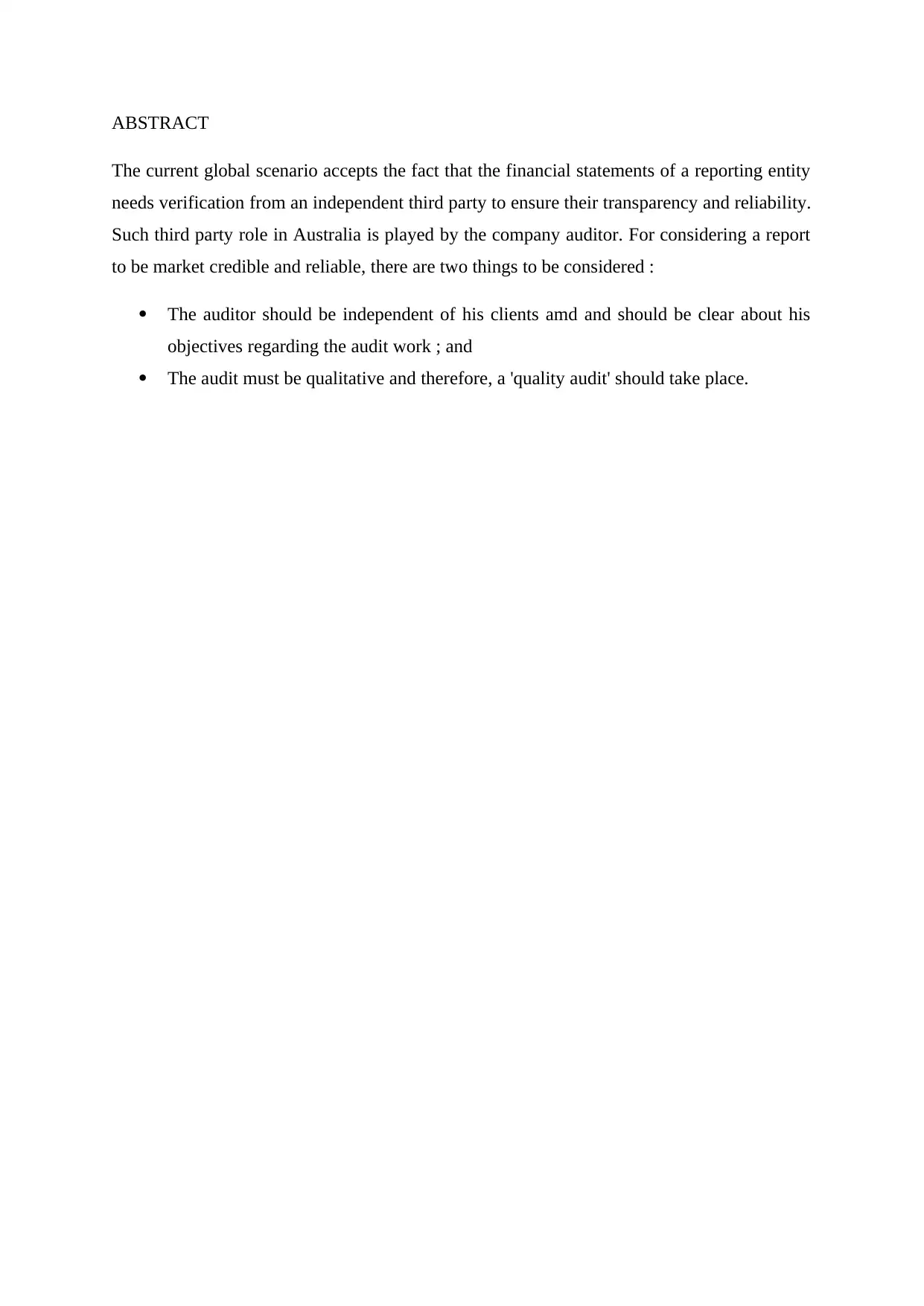
ABSTRACT
The current global scenario accepts the fact that the financial statements of a reporting entity
needs verification from an independent third party to ensure their transparency and reliability.
Such third party role in Australia is played by the company auditor. For considering a report
to be market credible and reliable, there are two things to be considered :
The auditor should be independent of his clients amd and should be clear about his
objectives regarding the audit work ; and
The audit must be qualitative and therefore, a 'quality audit' should take place.
The current global scenario accepts the fact that the financial statements of a reporting entity
needs verification from an independent third party to ensure their transparency and reliability.
Such third party role in Australia is played by the company auditor. For considering a report
to be market credible and reliable, there are two things to be considered :
The auditor should be independent of his clients amd and should be clear about his
objectives regarding the audit work ; and
The audit must be qualitative and therefore, a 'quality audit' should take place.
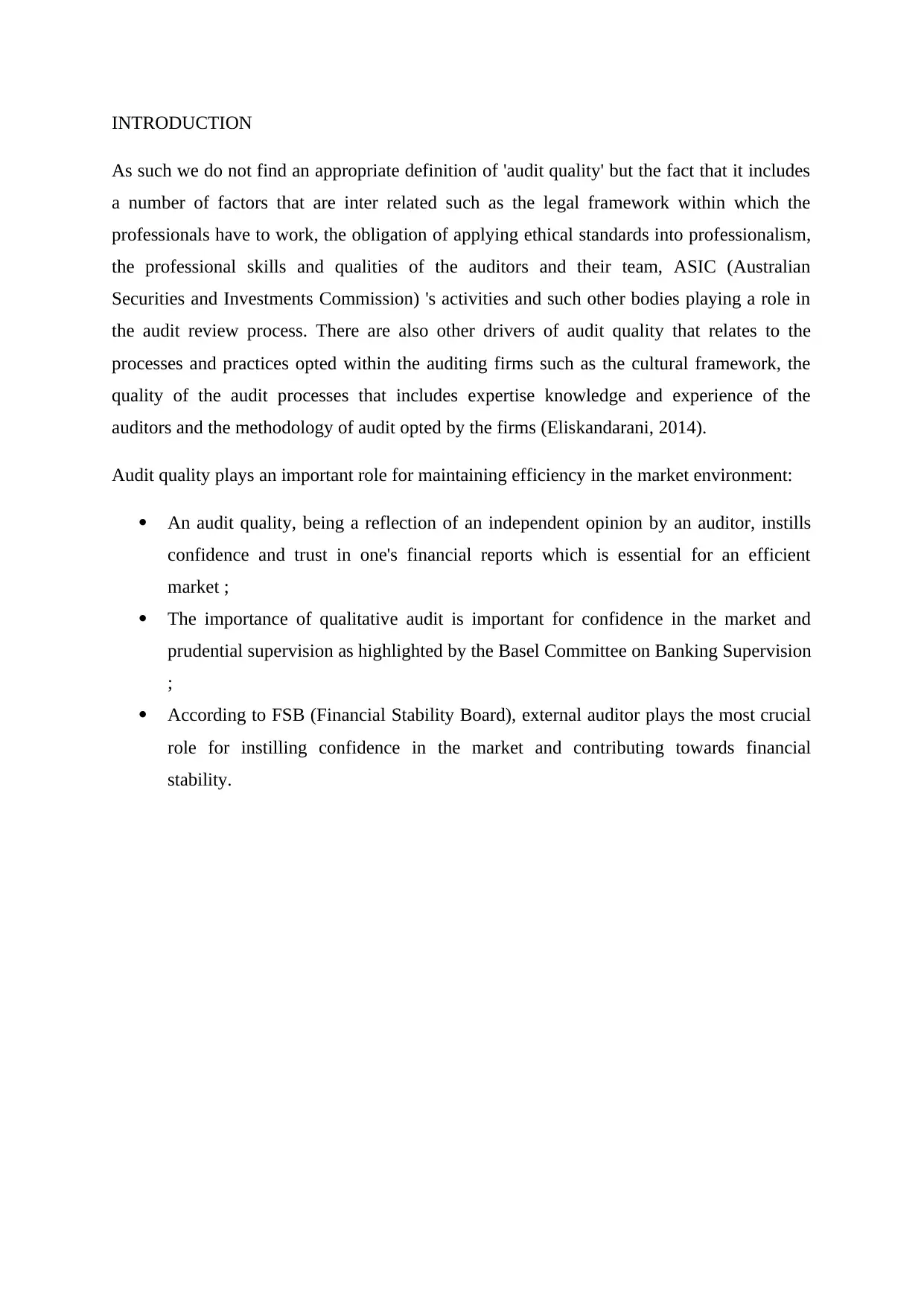
INTRODUCTION
As such we do not find an appropriate definition of 'audit quality' but the fact that it includes
a number of factors that are inter related such as the legal framework within which the
professionals have to work, the obligation of applying ethical standards into professionalism,
the professional skills and qualities of the auditors and their team, ASIC (Australian
Securities and Investments Commission) 's activities and such other bodies playing a role in
the audit review process. There are also other drivers of audit quality that relates to the
processes and practices opted within the auditing firms such as the cultural framework, the
quality of the audit processes that includes expertise knowledge and experience of the
auditors and the methodology of audit opted by the firms (Eliskandarani, 2014).
Audit quality plays an important role for maintaining efficiency in the market environment:
An audit quality, being a reflection of an independent opinion by an auditor, instills
confidence and trust in one's financial reports which is essential for an efficient
market ;
The importance of qualitative audit is important for confidence in the market and
prudential supervision as highlighted by the Basel Committee on Banking Supervision
;
According to FSB (Financial Stability Board), external auditor plays the most crucial
role for instilling confidence in the market and contributing towards financial
stability.
As such we do not find an appropriate definition of 'audit quality' but the fact that it includes
a number of factors that are inter related such as the legal framework within which the
professionals have to work, the obligation of applying ethical standards into professionalism,
the professional skills and qualities of the auditors and their team, ASIC (Australian
Securities and Investments Commission) 's activities and such other bodies playing a role in
the audit review process. There are also other drivers of audit quality that relates to the
processes and practices opted within the auditing firms such as the cultural framework, the
quality of the audit processes that includes expertise knowledge and experience of the
auditors and the methodology of audit opted by the firms (Eliskandarani, 2014).
Audit quality plays an important role for maintaining efficiency in the market environment:
An audit quality, being a reflection of an independent opinion by an auditor, instills
confidence and trust in one's financial reports which is essential for an efficient
market ;
The importance of qualitative audit is important for confidence in the market and
prudential supervision as highlighted by the Basel Committee on Banking Supervision
;
According to FSB (Financial Stability Board), external auditor plays the most crucial
role for instilling confidence in the market and contributing towards financial
stability.
⊘ This is a preview!⊘
Do you want full access?
Subscribe today to unlock all pages.

Trusted by 1+ million students worldwide
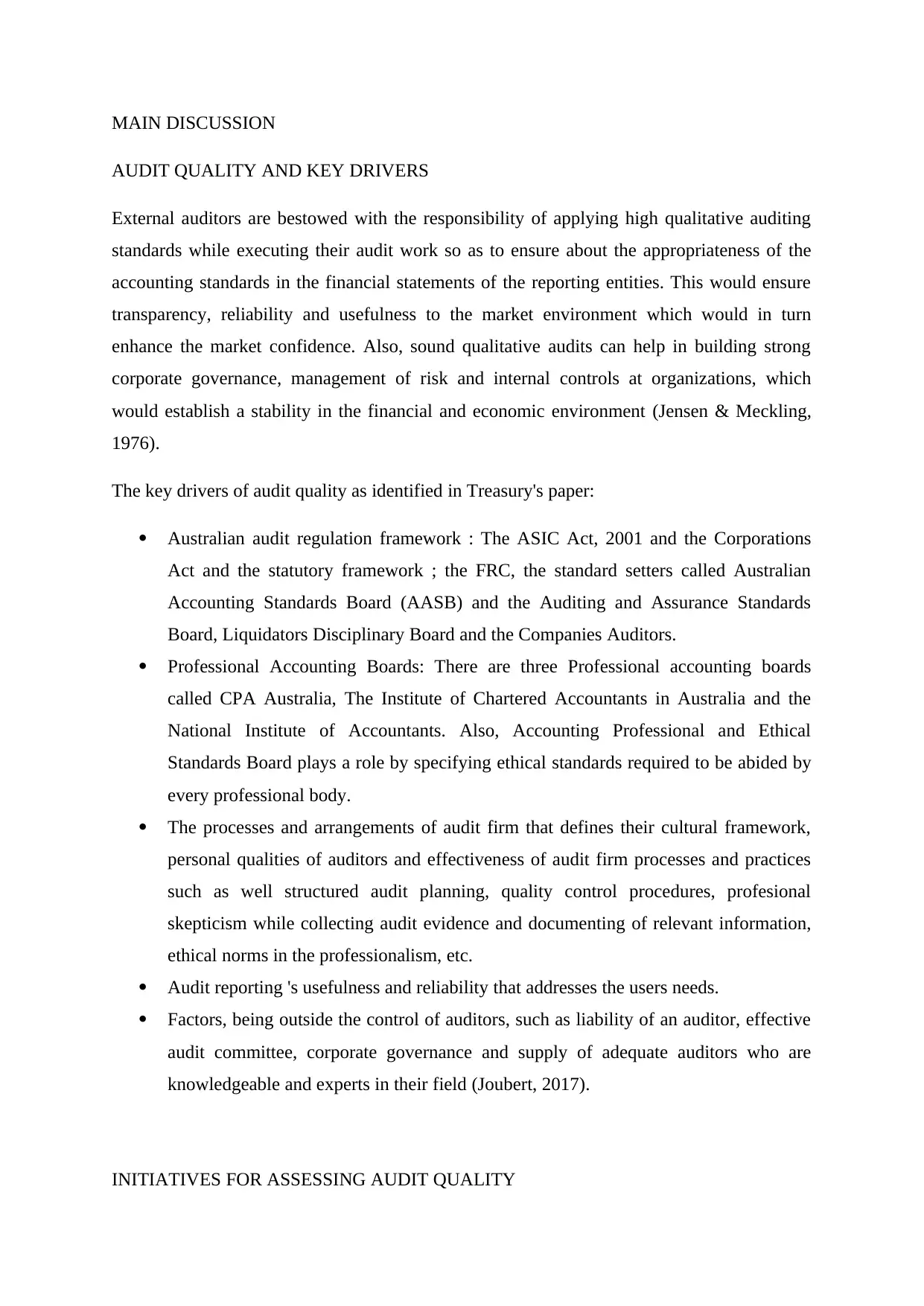
MAIN DISCUSSION
AUDIT QUALITY AND KEY DRIVERS
External auditors are bestowed with the responsibility of applying high qualitative auditing
standards while executing their audit work so as to ensure about the appropriateness of the
accounting standards in the financial statements of the reporting entities. This would ensure
transparency, reliability and usefulness to the market environment which would in turn
enhance the market confidence. Also, sound qualitative audits can help in building strong
corporate governance, management of risk and internal controls at organizations, which
would establish a stability in the financial and economic environment (Jensen & Meckling,
1976).
The key drivers of audit quality as identified in Treasury's paper:
Australian audit regulation framework : The ASIC Act, 2001 and the Corporations
Act and the statutory framework ; the FRC, the standard setters called Australian
Accounting Standards Board (AASB) and the Auditing and Assurance Standards
Board, Liquidators Disciplinary Board and the Companies Auditors.
Professional Accounting Boards: There are three Professional accounting boards
called CPA Australia, The Institute of Chartered Accountants in Australia and the
National Institute of Accountants. Also, Accounting Professional and Ethical
Standards Board plays a role by specifying ethical standards required to be abided by
every professional body.
The processes and arrangements of audit firm that defines their cultural framework,
personal qualities of auditors and effectiveness of audit firm processes and practices
such as well structured audit planning, quality control procedures, profesional
skepticism while collecting audit evidence and documenting of relevant information,
ethical norms in the professionalism, etc.
Audit reporting 's usefulness and reliability that addresses the users needs.
Factors, being outside the control of auditors, such as liability of an auditor, effective
audit committee, corporate governance and supply of adequate auditors who are
knowledgeable and experts in their field (Joubert, 2017).
INITIATIVES FOR ASSESSING AUDIT QUALITY
AUDIT QUALITY AND KEY DRIVERS
External auditors are bestowed with the responsibility of applying high qualitative auditing
standards while executing their audit work so as to ensure about the appropriateness of the
accounting standards in the financial statements of the reporting entities. This would ensure
transparency, reliability and usefulness to the market environment which would in turn
enhance the market confidence. Also, sound qualitative audits can help in building strong
corporate governance, management of risk and internal controls at organizations, which
would establish a stability in the financial and economic environment (Jensen & Meckling,
1976).
The key drivers of audit quality as identified in Treasury's paper:
Australian audit regulation framework : The ASIC Act, 2001 and the Corporations
Act and the statutory framework ; the FRC, the standard setters called Australian
Accounting Standards Board (AASB) and the Auditing and Assurance Standards
Board, Liquidators Disciplinary Board and the Companies Auditors.
Professional Accounting Boards: There are three Professional accounting boards
called CPA Australia, The Institute of Chartered Accountants in Australia and the
National Institute of Accountants. Also, Accounting Professional and Ethical
Standards Board plays a role by specifying ethical standards required to be abided by
every professional body.
The processes and arrangements of audit firm that defines their cultural framework,
personal qualities of auditors and effectiveness of audit firm processes and practices
such as well structured audit planning, quality control procedures, profesional
skepticism while collecting audit evidence and documenting of relevant information,
ethical norms in the professionalism, etc.
Audit reporting 's usefulness and reliability that addresses the users needs.
Factors, being outside the control of auditors, such as liability of an auditor, effective
audit committee, corporate governance and supply of adequate auditors who are
knowledgeable and experts in their field (Joubert, 2017).
INITIATIVES FOR ASSESSING AUDIT QUALITY
Paraphrase This Document
Need a fresh take? Get an instant paraphrase of this document with our AI Paraphraser
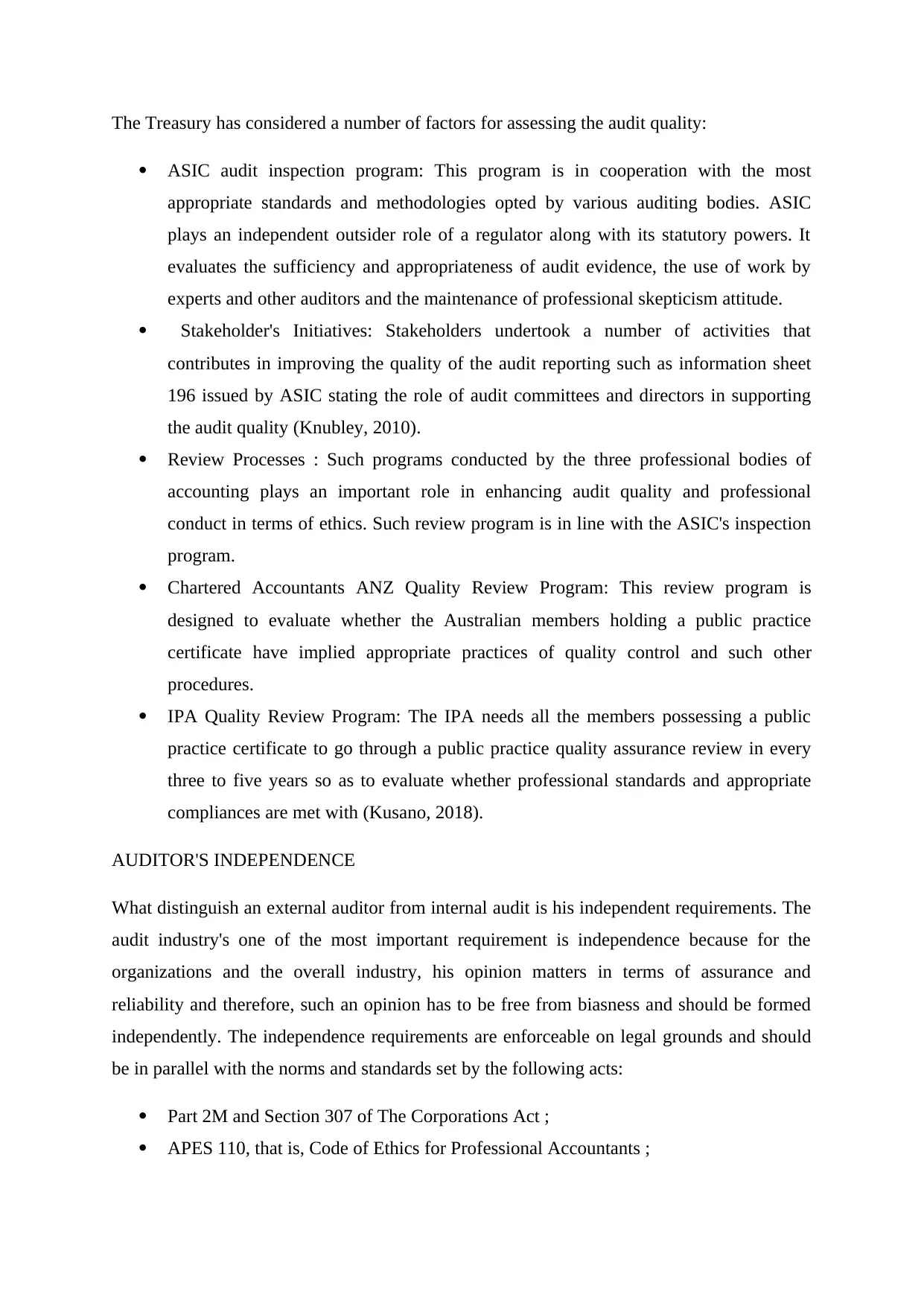
The Treasury has considered a number of factors for assessing the audit quality:
ASIC audit inspection program: This program is in cooperation with the most
appropriate standards and methodologies opted by various auditing bodies. ASIC
plays an independent outsider role of a regulator along with its statutory powers. It
evaluates the sufficiency and appropriateness of audit evidence, the use of work by
experts and other auditors and the maintenance of professional skepticism attitude.
Stakeholder's Initiatives: Stakeholders undertook a number of activities that
contributes in improving the quality of the audit reporting such as information sheet
196 issued by ASIC stating the role of audit committees and directors in supporting
the audit quality (Knubley, 2010).
Review Processes : Such programs conducted by the three professional bodies of
accounting plays an important role in enhancing audit quality and professional
conduct in terms of ethics. Such review program is in line with the ASIC's inspection
program.
Chartered Accountants ANZ Quality Review Program: This review program is
designed to evaluate whether the Australian members holding a public practice
certificate have implied appropriate practices of quality control and such other
procedures.
IPA Quality Review Program: The IPA needs all the members possessing a public
practice certificate to go through a public practice quality assurance review in every
three to five years so as to evaluate whether professional standards and appropriate
compliances are met with (Kusano, 2018).
AUDITOR'S INDEPENDENCE
What distinguish an external auditor from internal audit is his independent requirements. The
audit industry's one of the most important requirement is independence because for the
organizations and the overall industry, his opinion matters in terms of assurance and
reliability and therefore, such an opinion has to be free from biasness and should be formed
independently. The independence requirements are enforceable on legal grounds and should
be in parallel with the norms and standards set by the following acts:
Part 2M and Section 307 of The Corporations Act ;
APES 110, that is, Code of Ethics for Professional Accountants ;
ASIC audit inspection program: This program is in cooperation with the most
appropriate standards and methodologies opted by various auditing bodies. ASIC
plays an independent outsider role of a regulator along with its statutory powers. It
evaluates the sufficiency and appropriateness of audit evidence, the use of work by
experts and other auditors and the maintenance of professional skepticism attitude.
Stakeholder's Initiatives: Stakeholders undertook a number of activities that
contributes in improving the quality of the audit reporting such as information sheet
196 issued by ASIC stating the role of audit committees and directors in supporting
the audit quality (Knubley, 2010).
Review Processes : Such programs conducted by the three professional bodies of
accounting plays an important role in enhancing audit quality and professional
conduct in terms of ethics. Such review program is in line with the ASIC's inspection
program.
Chartered Accountants ANZ Quality Review Program: This review program is
designed to evaluate whether the Australian members holding a public practice
certificate have implied appropriate practices of quality control and such other
procedures.
IPA Quality Review Program: The IPA needs all the members possessing a public
practice certificate to go through a public practice quality assurance review in every
three to five years so as to evaluate whether professional standards and appropriate
compliances are met with (Kusano, 2018).
AUDITOR'S INDEPENDENCE
What distinguish an external auditor from internal audit is his independent requirements. The
audit industry's one of the most important requirement is independence because for the
organizations and the overall industry, his opinion matters in terms of assurance and
reliability and therefore, such an opinion has to be free from biasness and should be formed
independently. The independence requirements are enforceable on legal grounds and should
be in parallel with the norms and standards set by the following acts:
Part 2M and Section 307 of The Corporations Act ;
APES 110, that is, Code of Ethics for Professional Accountants ;
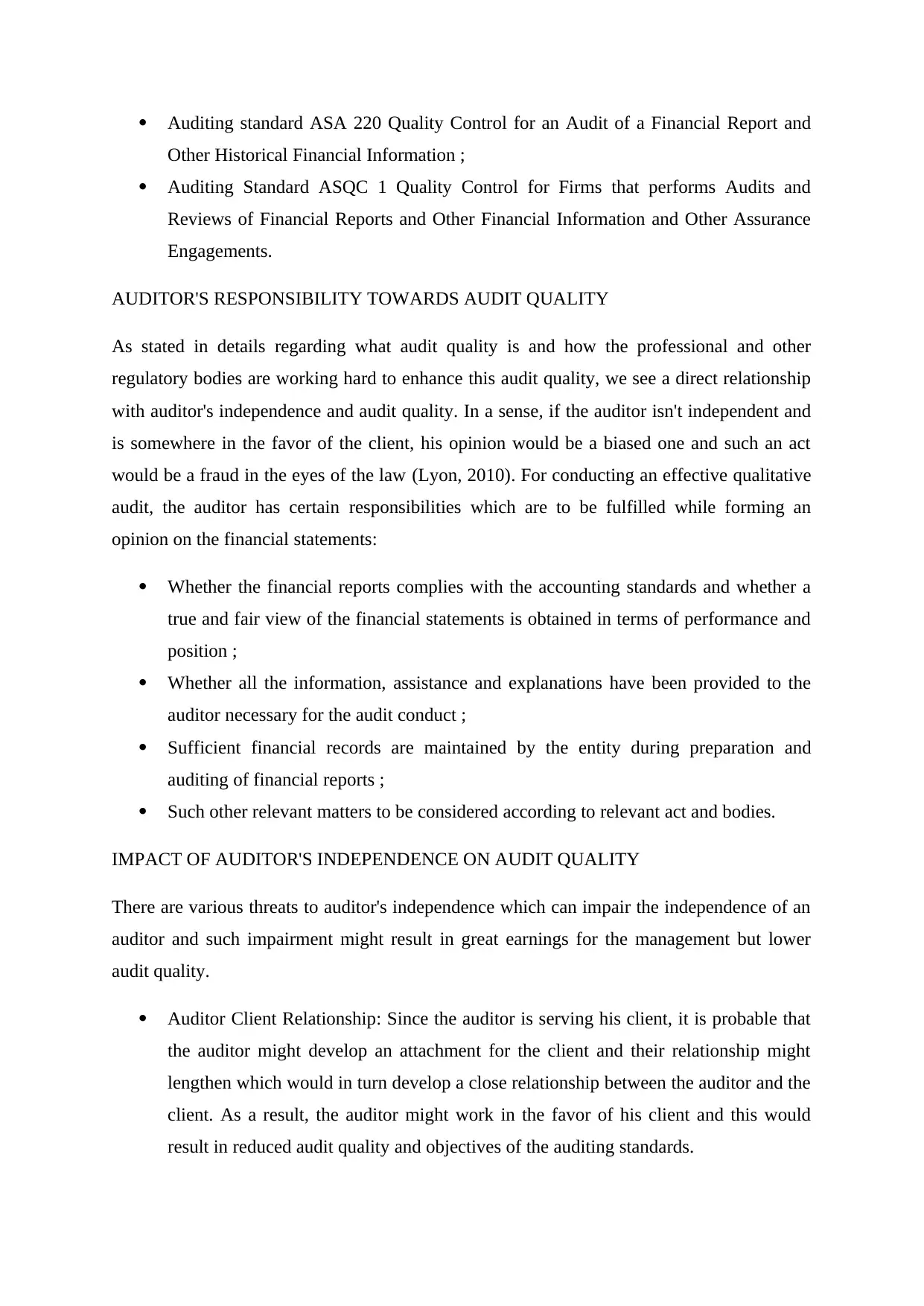
Auditing standard ASA 220 Quality Control for an Audit of a Financial Report and
Other Historical Financial Information ;
Auditing Standard ASQC 1 Quality Control for Firms that performs Audits and
Reviews of Financial Reports and Other Financial Information and Other Assurance
Engagements.
AUDITOR'S RESPONSIBILITY TOWARDS AUDIT QUALITY
As stated in details regarding what audit quality is and how the professional and other
regulatory bodies are working hard to enhance this audit quality, we see a direct relationship
with auditor's independence and audit quality. In a sense, if the auditor isn't independent and
is somewhere in the favor of the client, his opinion would be a biased one and such an act
would be a fraud in the eyes of the law (Lyon, 2010). For conducting an effective qualitative
audit, the auditor has certain responsibilities which are to be fulfilled while forming an
opinion on the financial statements:
Whether the financial reports complies with the accounting standards and whether a
true and fair view of the financial statements is obtained in terms of performance and
position ;
Whether all the information, assistance and explanations have been provided to the
auditor necessary for the audit conduct ;
Sufficient financial records are maintained by the entity during preparation and
auditing of financial reports ;
Such other relevant matters to be considered according to relevant act and bodies.
IMPACT OF AUDITOR'S INDEPENDENCE ON AUDIT QUALITY
There are various threats to auditor's independence which can impair the independence of an
auditor and such impairment might result in great earnings for the management but lower
audit quality.
Auditor Client Relationship: Since the auditor is serving his client, it is probable that
the auditor might develop an attachment for the client and their relationship might
lengthen which would in turn develop a close relationship between the auditor and the
client. As a result, the auditor might work in the favor of his client and this would
result in reduced audit quality and objectives of the auditing standards.
Other Historical Financial Information ;
Auditing Standard ASQC 1 Quality Control for Firms that performs Audits and
Reviews of Financial Reports and Other Financial Information and Other Assurance
Engagements.
AUDITOR'S RESPONSIBILITY TOWARDS AUDIT QUALITY
As stated in details regarding what audit quality is and how the professional and other
regulatory bodies are working hard to enhance this audit quality, we see a direct relationship
with auditor's independence and audit quality. In a sense, if the auditor isn't independent and
is somewhere in the favor of the client, his opinion would be a biased one and such an act
would be a fraud in the eyes of the law (Lyon, 2010). For conducting an effective qualitative
audit, the auditor has certain responsibilities which are to be fulfilled while forming an
opinion on the financial statements:
Whether the financial reports complies with the accounting standards and whether a
true and fair view of the financial statements is obtained in terms of performance and
position ;
Whether all the information, assistance and explanations have been provided to the
auditor necessary for the audit conduct ;
Sufficient financial records are maintained by the entity during preparation and
auditing of financial reports ;
Such other relevant matters to be considered according to relevant act and bodies.
IMPACT OF AUDITOR'S INDEPENDENCE ON AUDIT QUALITY
There are various threats to auditor's independence which can impair the independence of an
auditor and such impairment might result in great earnings for the management but lower
audit quality.
Auditor Client Relationship: Since the auditor is serving his client, it is probable that
the auditor might develop an attachment for the client and their relationship might
lengthen which would in turn develop a close relationship between the auditor and the
client. As a result, the auditor might work in the favor of his client and this would
result in reduced audit quality and objectives of the auditing standards.
⊘ This is a preview!⊘
Do you want full access?
Subscribe today to unlock all pages.

Trusted by 1+ million students worldwide
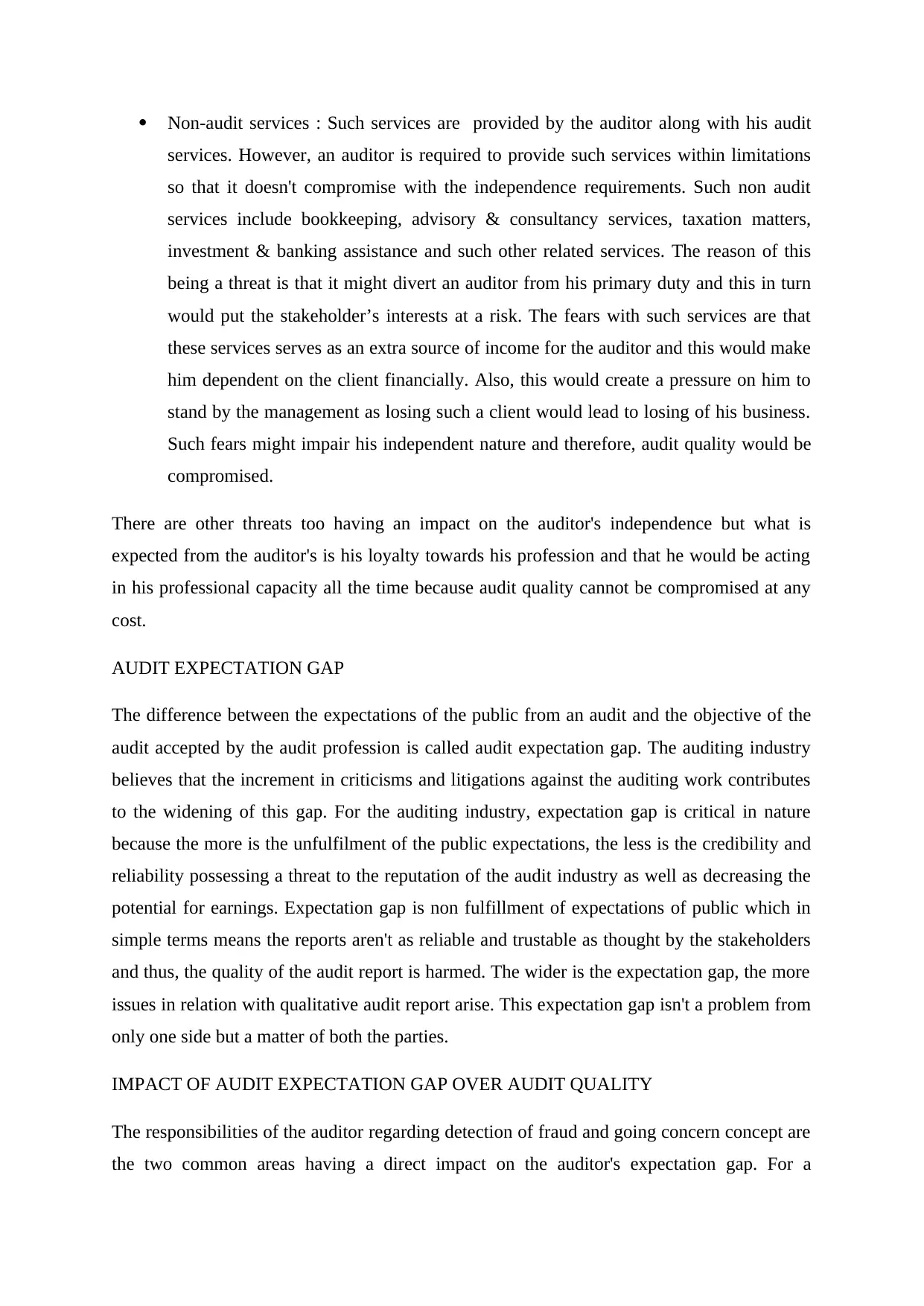
Non-audit services : Such services are provided by the auditor along with his audit
services. However, an auditor is required to provide such services within limitations
so that it doesn't compromise with the independence requirements. Such non audit
services include bookkeeping, advisory & consultancy services, taxation matters,
investment & banking assistance and such other related services. The reason of this
being a threat is that it might divert an auditor from his primary duty and this in turn
would put the stakeholder’s interests at a risk. The fears with such services are that
these services serves as an extra source of income for the auditor and this would make
him dependent on the client financially. Also, this would create a pressure on him to
stand by the management as losing such a client would lead to losing of his business.
Such fears might impair his independent nature and therefore, audit quality would be
compromised.
There are other threats too having an impact on the auditor's independence but what is
expected from the auditor's is his loyalty towards his profession and that he would be acting
in his professional capacity all the time because audit quality cannot be compromised at any
cost.
AUDIT EXPECTATION GAP
The difference between the expectations of the public from an audit and the objective of the
audit accepted by the audit profession is called audit expectation gap. The auditing industry
believes that the increment in criticisms and litigations against the auditing work contributes
to the widening of this gap. For the auditing industry, expectation gap is critical in nature
because the more is the unfulfilment of the public expectations, the less is the credibility and
reliability possessing a threat to the reputation of the audit industry as well as decreasing the
potential for earnings. Expectation gap is non fulfillment of expectations of public which in
simple terms means the reports aren't as reliable and trustable as thought by the stakeholders
and thus, the quality of the audit report is harmed. The wider is the expectation gap, the more
issues in relation with qualitative audit report arise. This expectation gap isn't a problem from
only one side but a matter of both the parties.
IMPACT OF AUDIT EXPECTATION GAP OVER AUDIT QUALITY
The responsibilities of the auditor regarding detection of fraud and going concern concept are
the two common areas having a direct impact on the auditor's expectation gap. For a
services. However, an auditor is required to provide such services within limitations
so that it doesn't compromise with the independence requirements. Such non audit
services include bookkeeping, advisory & consultancy services, taxation matters,
investment & banking assistance and such other related services. The reason of this
being a threat is that it might divert an auditor from his primary duty and this in turn
would put the stakeholder’s interests at a risk. The fears with such services are that
these services serves as an extra source of income for the auditor and this would make
him dependent on the client financially. Also, this would create a pressure on him to
stand by the management as losing such a client would lead to losing of his business.
Such fears might impair his independent nature and therefore, audit quality would be
compromised.
There are other threats too having an impact on the auditor's independence but what is
expected from the auditor's is his loyalty towards his profession and that he would be acting
in his professional capacity all the time because audit quality cannot be compromised at any
cost.
AUDIT EXPECTATION GAP
The difference between the expectations of the public from an audit and the objective of the
audit accepted by the audit profession is called audit expectation gap. The auditing industry
believes that the increment in criticisms and litigations against the auditing work contributes
to the widening of this gap. For the auditing industry, expectation gap is critical in nature
because the more is the unfulfilment of the public expectations, the less is the credibility and
reliability possessing a threat to the reputation of the audit industry as well as decreasing the
potential for earnings. Expectation gap is non fulfillment of expectations of public which in
simple terms means the reports aren't as reliable and trustable as thought by the stakeholders
and thus, the quality of the audit report is harmed. The wider is the expectation gap, the more
issues in relation with qualitative audit report arise. This expectation gap isn't a problem from
only one side but a matter of both the parties.
IMPACT OF AUDIT EXPECTATION GAP OVER AUDIT QUALITY
The responsibilities of the auditor regarding detection of fraud and going concern concept are
the two common areas having a direct impact on the auditor's expectation gap. For a
Paraphrase This Document
Need a fresh take? Get an instant paraphrase of this document with our AI Paraphraser
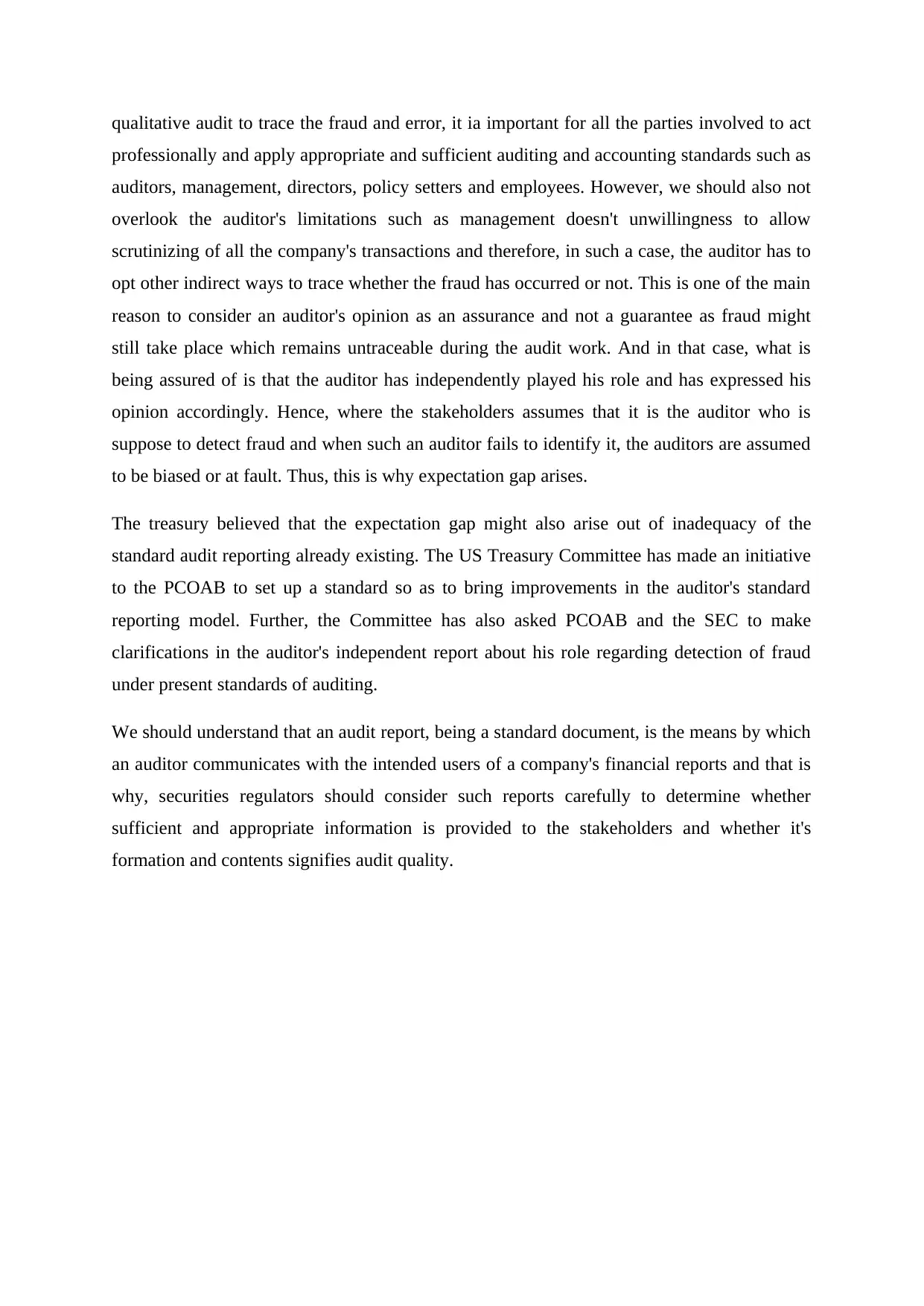
qualitative audit to trace the fraud and error, it ia important for all the parties involved to act
professionally and apply appropriate and sufficient auditing and accounting standards such as
auditors, management, directors, policy setters and employees. However, we should also not
overlook the auditor's limitations such as management doesn't unwillingness to allow
scrutinizing of all the company's transactions and therefore, in such a case, the auditor has to
opt other indirect ways to trace whether the fraud has occurred or not. This is one of the main
reason to consider an auditor's opinion as an assurance and not a guarantee as fraud might
still take place which remains untraceable during the audit work. And in that case, what is
being assured of is that the auditor has independently played his role and has expressed his
opinion accordingly. Hence, where the stakeholders assumes that it is the auditor who is
suppose to detect fraud and when such an auditor fails to identify it, the auditors are assumed
to be biased or at fault. Thus, this is why expectation gap arises.
The treasury believed that the expectation gap might also arise out of inadequacy of the
standard audit reporting already existing. The US Treasury Committee has made an initiative
to the PCOAB to set up a standard so as to bring improvements in the auditor's standard
reporting model. Further, the Committee has also asked PCOAB and the SEC to make
clarifications in the auditor's independent report about his role regarding detection of fraud
under present standards of auditing.
We should understand that an audit report, being a standard document, is the means by which
an auditor communicates with the intended users of a company's financial reports and that is
why, securities regulators should consider such reports carefully to determine whether
sufficient and appropriate information is provided to the stakeholders and whether it's
formation and contents signifies audit quality.
professionally and apply appropriate and sufficient auditing and accounting standards such as
auditors, management, directors, policy setters and employees. However, we should also not
overlook the auditor's limitations such as management doesn't unwillingness to allow
scrutinizing of all the company's transactions and therefore, in such a case, the auditor has to
opt other indirect ways to trace whether the fraud has occurred or not. This is one of the main
reason to consider an auditor's opinion as an assurance and not a guarantee as fraud might
still take place which remains untraceable during the audit work. And in that case, what is
being assured of is that the auditor has independently played his role and has expressed his
opinion accordingly. Hence, where the stakeholders assumes that it is the auditor who is
suppose to detect fraud and when such an auditor fails to identify it, the auditors are assumed
to be biased or at fault. Thus, this is why expectation gap arises.
The treasury believed that the expectation gap might also arise out of inadequacy of the
standard audit reporting already existing. The US Treasury Committee has made an initiative
to the PCOAB to set up a standard so as to bring improvements in the auditor's standard
reporting model. Further, the Committee has also asked PCOAB and the SEC to make
clarifications in the auditor's independent report about his role regarding detection of fraud
under present standards of auditing.
We should understand that an audit report, being a standard document, is the means by which
an auditor communicates with the intended users of a company's financial reports and that is
why, securities regulators should consider such reports carefully to determine whether
sufficient and appropriate information is provided to the stakeholders and whether it's
formation and contents signifies audit quality.
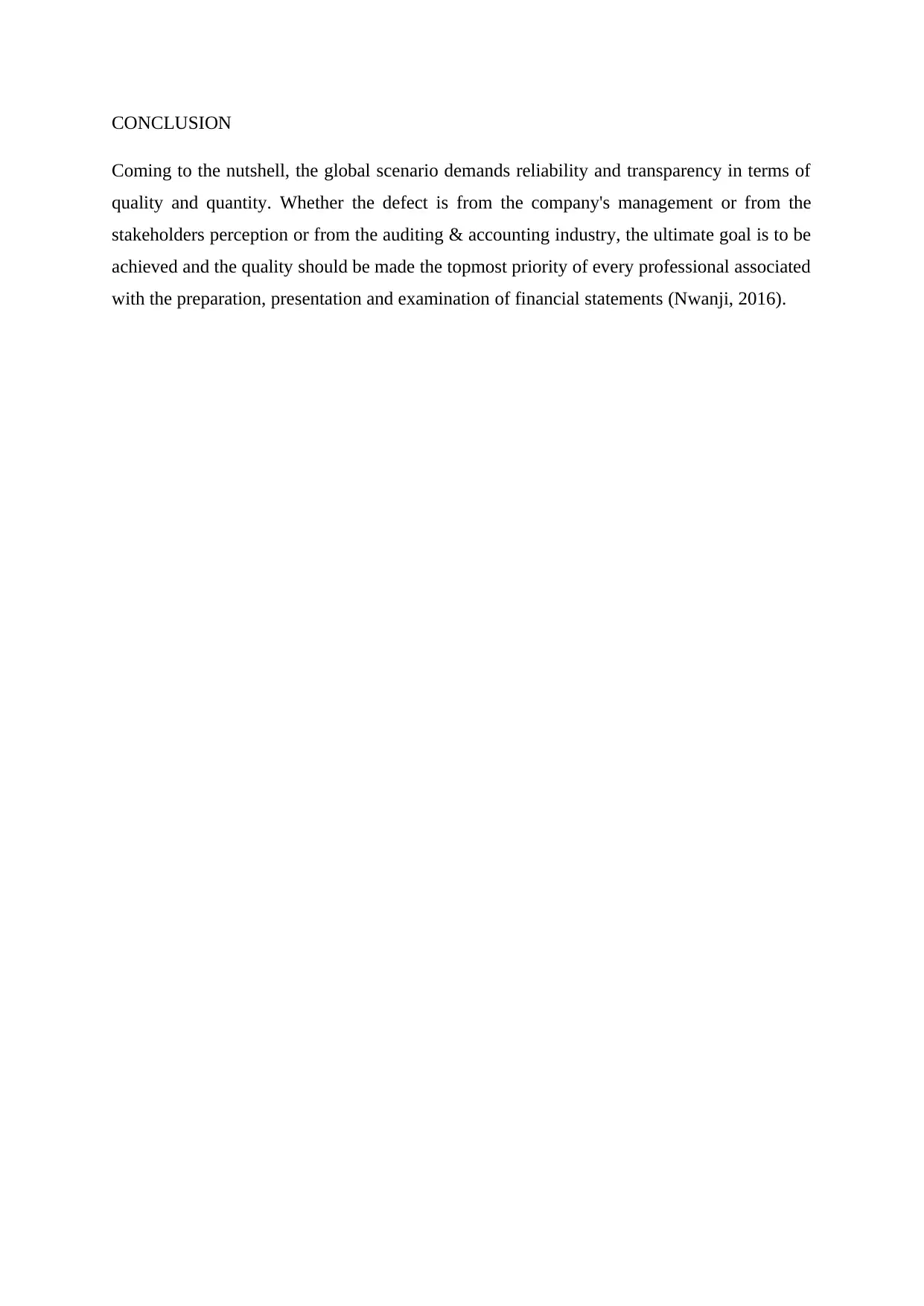
CONCLUSION
Coming to the nutshell, the global scenario demands reliability and transparency in terms of
quality and quantity. Whether the defect is from the company's management or from the
stakeholders perception or from the auditing & accounting industry, the ultimate goal is to be
achieved and the quality should be made the topmost priority of every professional associated
with the preparation, presentation and examination of financial statements (Nwanji, 2016).
Coming to the nutshell, the global scenario demands reliability and transparency in terms of
quality and quantity. Whether the defect is from the company's management or from the
stakeholders perception or from the auditing & accounting industry, the ultimate goal is to be
achieved and the quality should be made the topmost priority of every professional associated
with the preparation, presentation and examination of financial statements (Nwanji, 2016).
⊘ This is a preview!⊘
Do you want full access?
Subscribe today to unlock all pages.

Trusted by 1+ million students worldwide
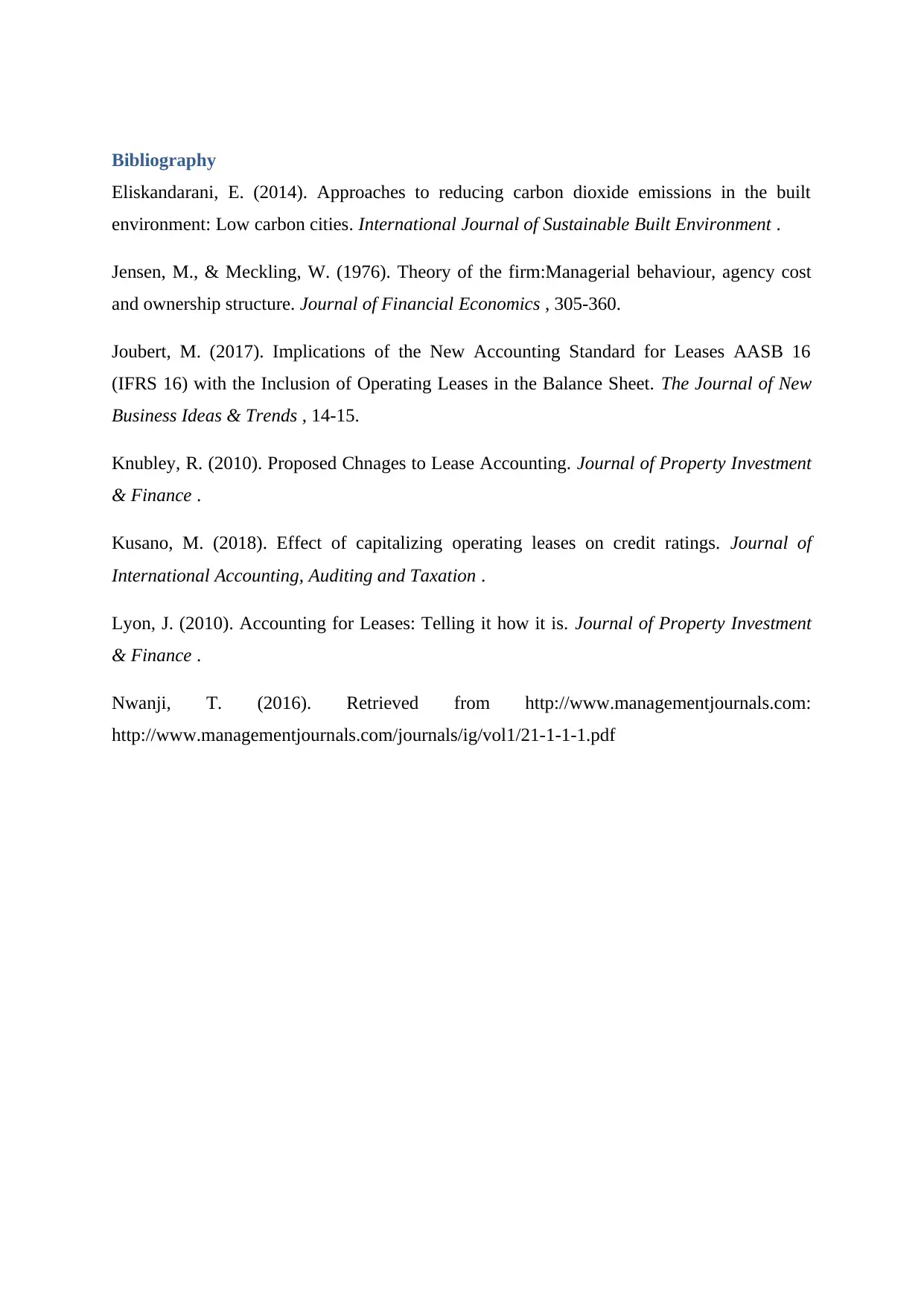
Bibliography
Eliskandarani, E. (2014). Approaches to reducing carbon dioxide emissions in the built
environment: Low carbon cities. International Journal of Sustainable Built Environment .
Jensen, M., & Meckling, W. (1976). Theory of the firm:Managerial behaviour, agency cost
and ownership structure. Journal of Financial Economics , 305-360.
Joubert, M. (2017). Implications of the New Accounting Standard for Leases AASB 16
(IFRS 16) with the Inclusion of Operating Leases in the Balance Sheet. The Journal of New
Business Ideas & Trends , 14-15.
Knubley, R. (2010). Proposed Chnages to Lease Accounting. Journal of Property Investment
& Finance .
Kusano, M. (2018). Effect of capitalizing operating leases on credit ratings. Journal of
International Accounting, Auditing and Taxation .
Lyon, J. (2010). Accounting for Leases: Telling it how it is. Journal of Property Investment
& Finance .
Nwanji, T. (2016). Retrieved from http://www.managementjournals.com:
http://www.managementjournals.com/journals/ig/vol1/21-1-1-1.pdf
Eliskandarani, E. (2014). Approaches to reducing carbon dioxide emissions in the built
environment: Low carbon cities. International Journal of Sustainable Built Environment .
Jensen, M., & Meckling, W. (1976). Theory of the firm:Managerial behaviour, agency cost
and ownership structure. Journal of Financial Economics , 305-360.
Joubert, M. (2017). Implications of the New Accounting Standard for Leases AASB 16
(IFRS 16) with the Inclusion of Operating Leases in the Balance Sheet. The Journal of New
Business Ideas & Trends , 14-15.
Knubley, R. (2010). Proposed Chnages to Lease Accounting. Journal of Property Investment
& Finance .
Kusano, M. (2018). Effect of capitalizing operating leases on credit ratings. Journal of
International Accounting, Auditing and Taxation .
Lyon, J. (2010). Accounting for Leases: Telling it how it is. Journal of Property Investment
& Finance .
Nwanji, T. (2016). Retrieved from http://www.managementjournals.com:
http://www.managementjournals.com/journals/ig/vol1/21-1-1-1.pdf
1 out of 10
Related Documents
Your All-in-One AI-Powered Toolkit for Academic Success.
+13062052269
info@desklib.com
Available 24*7 on WhatsApp / Email
![[object Object]](/_next/static/media/star-bottom.7253800d.svg)
Unlock your academic potential
Copyright © 2020–2026 A2Z Services. All Rights Reserved. Developed and managed by ZUCOL.





